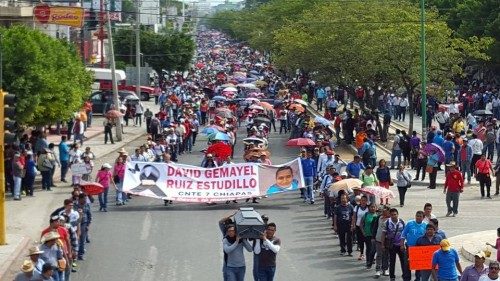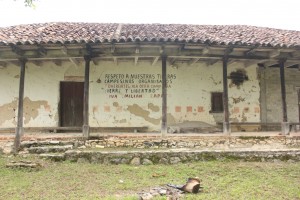
Reformas legales

(Español) Organizaciones de Chiapas se manifiestan por el magisterio
San Cristóbal de Las Casas, Chiapas; 29 de mayo de 2016
P R O N U N C I A M I E N T O
Estado Mexicano viola Derechos Humanos de magisterio en Chiapas
ante la imposición de la Reforma Educativa Federal
El movimiento magisterial en México, y particularmente en Chiapas, representa una de las mayores fuerzas políticas del país. En el transcurso de este año con la jornada nacional llamada “nueva lucha contra la reforma educativa, por la defensa de la enseñanza pública y la estabilidad laboral”, las maestras y maestros han expresado su rechazo a la política privatizadora de Enrique Peña Nieto.
El gobierno federal y estatal ha tratado de minimizar la dimensión de las protestas en el Estado de Chiapas, obviando que a éstas se han sumado estudiantes, familias, sindicatos, transportistas, pueblos indígenas, organizaciones sociales y campesinas que han manifestado su rechazo a los actos de desprestigio y represión ejecutados en contra de integrantes de las Secciones 7 y 40 de la Coordinadora Nacional de Trabajadores de la Educación (CNTE), agremiados al Sindicato Nacional de Trabajadores de la Educación (SNTE).
Ejemplo de ello fue lo sucedido el pasado 15 de abril cuando la policía federal y estatal, lejos de todo protocolo de actuación, lanzó gases lacrimógenos de manera indiscriminada contra la sociedad civil en general y usó balas de goma en contra de docentes que se encontraban marchando en las ciudades de San Cristóbal de Las Casas y Tuxtla Gutiérrez; Testimonio de ello fue ampliamente difundido a través de redes sociales y medios alternativos que publicaron las denuncias de abuso de autoridad derivado del operativo así como la presencia de grupos de choque que se infiltraban en las protestas, mientras tanto los medios oficiales ocultaron y tergiversaron la información equiparando a los manifestantes como delincuentes.
Esta situación se agrava con las declaraciones del Secretario de Gobierno de Chiapas, Juan Carlos Gómez Aranda, quien avaló el actuar desmedido de los cuerpos policiacos justificando “garantizar el libre tránsito”.
El 16 de abril, el Centro de Derechos Humanos Fray Bartolomé de Las Casas (Frayba) informó1 del uso desproporcionado de la fuerza pública en contra de la ciudadanía y de la detención arbitraria de 8 profesoras, 10 profesores y tres personas más que fueron privadas arbitrariamente de su libertad y sometidos a actos de tortura, tratos crueles, inhumanos y degradantes; así como del ilegal traslado de los detenidos al penal de máxima seguridad en la ciudad de Tepic, Nayarit, señalándoles delitos por ataques a las vías de comunicación, daños, lesiones y terrorismo, acusaciones que forman parte de un patrón recurrente por el Estado para criminalizar a quienes ejercen su Derecho a la protesta social.
May: Between Authoritarism and Resistance
May: Between Authoritarianism and Resistance
The calendar? May 2016
The geography?
Well, it could be any part of this country, scratched open and bleeding with forced disappearances, impunity made institution, intolerance as a form of government, corruption as the modus vivendi of a fetid and mediocre political class.
But it could also be any part of this country healed by the persistence of the families who do not forget their missing, their tenacious search for truth and justice, their rebellious resistance in the face of blows, bullets, and clubs, and their eagerness to construct a path without masters, bosses, saviors, guides, or caudillos; through defense, resistance, rebellion; through the strength of pain and rage making the crack deeper and wider.
“Mexico” as this country is commonly called, reflects in its own way the crisis that is shaking the entire world.
It seems that at some moment in the brief and intense history of the 20th century, this country was an international referent for tourism. One heard about its landscapes, its gastronomy, the hospitality of its people, the perfection of the perfect dictatorship.
But both before and during this travel agency pamphlet image, what happened happened. No, I won’t ply you with information on what has happened in the immediate past, say the last 30 years.
The thing is that over the past few years, “Mexico” has become a world referent for governmental corruption; for the cruelty of narco-trafficking; the full complicity and cohabitation, not merely infiltration, of organized crime and the official institutions; the forced disappearances; the army out of the barracks and into the streets and onto the highways; the murders and imprisonments of opposition figures, journalists, and others; the “warning” signs on the paths of tourists; the cynicism as idiosyncrasy in the media and social networks; and life, freedom, and personal possessions gambled in the deadly roulette of daily life (“if they didn’t come for you today, maybe tomorrow”). If you are a woman, of whatever age, multiply the risks. The feminine, along with any difference, is ahead only in this respect: more likely to suffer violence, disappearance, death.






